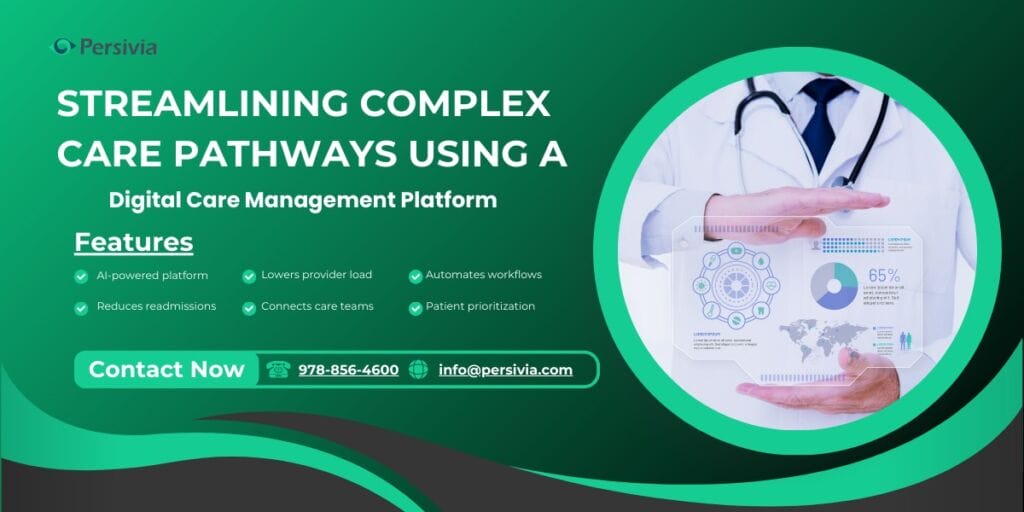AI-powered and evidence-based algorithms within digital care management platforms simplify the complex pathway of caring for a patient. Such platforms combine data of patients, automate care plans, help in hospital readmission reductions by up to 65%, and lower provider loads by 85%. Key functionality includes risk stratification, care gap analysis, telehealth integration, and multi-channel communication, enabling healthcare teams to coordinate patient care across the entire care continuum in a new way.
Healthcare providers are under continuous strain to increase coordinated care at a time when a more complicated patient population grows. Conventional care coordination techniques frequently lead to disjointed communication, unaddressed care possibilities, as well as avoidable hospital readmissions. The Care Management Platform deals with those challenges by consolidating patient information and automation care delivery processes across various touchpoints.
Healthcare in the modern age requires that there be smooth interaction among primary care physicians, specialists, care managers, as well as patients themselves. Digital platforms introduce high-level solutions in which clinical data to support care, claims to understand how care is paid, and social determinants of health to put care plans into action are being combined. These systems use artificial intelligence in detecting high-risk patients, recommending evidence-based interventions, and helping in establishing real-time communication among the members of the care team.
The transition to value-based care has increased the rate at which comprehensive care management technologies are implemented. Healthcare organizations need platforms that not only manage patient populations but also show quantifiable outcomes of improved quality measures and cost reduction. Intelligent automation and data-based insights present such outcomes in advanced care management solutions.

LOCAL NEWS: 100 best places to work and live in Arizona for 2025
INDUSTRY INSIGHTS: Want more news like this? Get our free newsletter here
What Are Complex Care Pathways?
Complex care pathways span across more than one healthcare provider, different treatment modules, and longer durations of care in patients with chronic conditions or multiple comorbidities. These care pathways demand coordinated actions in various care sites, including primary care offices, specialist clinics, and hospital systems.
Patients in the management of diabetes, heart disease, or cancer commonly follow intricate care pathways through:
- Primary care management and routine monitoring
- Specialist consultations and procedures
- Laboratory testing and diagnostic imaging
- Medication management and therapy coordination
- Patient education and lifestyle interventions
- Emergency care and hospital admissions when complications arise
What is care management? It is a well-organized process whereby health services are planned in a systematic manner so that patients are brought in to receive the right care at the right time, at the right place, and using the best resources.
Why Traditional Care Coordination Falls Short
The process of conventional care coordination is, to a great extent, dependent on manual manipulations, hard copy communication, and a lack of integration between systems that results in lapses in patient care. These shortcomings create even a bigger problem when dealing with sick people who have more than simple medical needs.
Common challenges include:
- Information silos: Patient data scattered across multiple electronic health records
- Communication delays: Phone calls, faxes, and emails that slow critical decision-making
- Care gaps: Missed follow-ups, medication adherence issues, and preventive care oversights
- Resource inefficiency: Care managers spend excessive time on administrative tasks
- Limited visibility: Inability to track patient progress across different care settings
Healthcare teams tend to identify care gaps only when the patient develops complications and visits the emergency department. This reactive methodology is more expensive and leads to poor patient outcomes.
How Digital Platforms Transform Care Management?
Digital care management platforms transform care coordination by unifying all patient data into a single longitudinal record and automating evidence-based care workflows. Powered by AI, they analyze each patient’s data to generate actionable insights that care teams can use in real time.
Data Integration Capabilities
Modern platforms incorporate multiple data sources into comprehensive patient profiles:
- Clinical data: Electronic health records, lab results, vital signs, and diagnostic reports
- Claims data: Insurance utilization patterns, procedure history, and cost information
- Patient-reported data: Symptoms, quality of life measures, and treatment preferences
- Device data: Remote monitoring readings, wearable device metrics, and home health measurements
- Socio-economic data: Social determinants of health that impact care access and outcomes
AI-Driven Insights and Analytics
Natural language processing, artificial intelligence, and machine learning transform unstructured data and integrate it with structured information to deliver patient-specific insights that are highly relevant. These technologies can see patterns that human reviewers overlook, foresee some issues before they arise.
Key Features of Advanced Care Management Solutions
Personalized Care Plans
Digital platforms extract information from different sources and auto-create patient-specific configurable care plans. These plans are evidence-based and are adjusted to personal situations and the needs of the patients.
Each care plan includes:
- Specific clinical interventions and treatment protocols
- Medication management and monitoring schedules
- Follow-up appointment recommendations
- Patient education materials and resources
- Measurable goals and outcome targets
Point-of-Care Integration
Patient-specific evidence-based clinical interventions are made available directly at the point of care through platforms. Information is provided to the providers actively in real-time, decision support tools, and care recommendations in their current workflows.
Risk Stratification
AI-enhanced risk stratification capabilities unify claims, clinical, and social determinants of health data to find patients at risk and in need of closer attention concerning their care management. This reactive model enables care teams to intervene with the development of complications.
| Risk Level | Characteristics | Interventions |
| High Risk | Multiple chronic conditions, recent hospitalizations | Intensive case management, weekly check-ins |
| Medium Risk | Controlled chronic conditions, occasional ED visits | Regular monitoring, quarterly assessments |
| Low Risk | Stable conditions, good self-management | Annual wellness visits, preventive care |
Care Gap Identification
Clinical and service care gap identification based on AI means no patient will slip through the cracks as far as identifying the gaps specific to each value-based care program. The system alerts automatically about missed screenings, overdue meds, and incomplete care plans.
Patient Engagement and Communication Tools
Multi-Channel Communication
The current care management applications allow the provider and the patient to communicate using numerous channels, such as options in real-time text, audio, and video calls. This versatility suits the various preferences and the level of comfort with technology that patients may have.
Patient Outreach and Portals
Platforms provide access to patient engagement in the form of special portals and mobile apps. These are AI-assisted interactions, assessments, and communications that enable patients to remain in touch with their care teams between office visits.
Patient engagement features include:
- Appointment scheduling and reminder systems
- Medication tracking and refill requests
- Educational content and care plan access
- Symptom reporting and health questionnaires
- Direct messaging with care team members
Telehealth Integration
The integration of Telehealth into the platform allows non-face-to-face patient interaction to be achieved through video interactions and allows billing options. This aspect was particularly useful during the COVID-19 pandemic, and it is further enhancing access to care for rural and mobility-restricted patients.
Workflow Integration and Efficiency
Seamless System Integration
More intricate systems have smooth integration into the current functions, operations without disrupting existing workflows. With this integration, care teams do not have to retrain or significantly reshape their workflows to incorporate new technologies.
Resource Prioritization
Streamlined workflows improve efficiency in managing care management resources. Automated task assignment, priority scoring, and workload balancing help care managers focus their attention on patients with the greatest needs.
Care managers benefit from:
- Automated patient risk scoring and prioritization
- Task management and reminder systems
- Caseload optimization and capacity planning
- Performance metrics and outcome tracking
- Reduced administrative burden through automation
Measurable Outcomes and Results
The introduction of comprehensive care management systems in healthcare organizations also yields tangible results comprising both clinical and operational performance. These findings show that the investment in advanced care coordination technologies is quite valuable.
Clinical Improvements
- 65% reduction in all-cause 30-day readmission rates
- Improved medication adherence and chronic disease management
- Earlier identification and intervention for at-risk patients
- Better coordination between primary care and specialty services
- Enhanced patient satisfaction scores and care experience ratings
Operational Benefits
- 85% reduction in provider workload through automation
- Streamlined care coordination processes and communication
- More efficient resource allocation and staff productivity
- Reduced administrative costs and manual documentation
- Improved compliance with quality metrics and reporting requirements
Evidence-Based Foundation
Major platforms integrate thousands of evidence-based, patient-specific, configurable algorithms and hundreds of patient-specific clinical pathways. The basis guarantees that care recommendations are headed towards present best practices and clinical guidelines.
Advanced Analytics and Cost Management
Utilization Analytics
Advanced cost and utilization analytics will assist healthcare organizations by aiding in the reduction of the total cost of care, overall utilization, emergency, and referrals outside the network. These insights support strategic decision-making and resource planning.
Analytics capabilities include:
- Real-time cost tracking and trend analysis
- Utilization pattern identification and optimization opportunities
- Provider performance metrics and benchmarking
- Population health management and outcome measurement
- Financial impact assessment and return on investment calculations
Predictive Modeling
The machine learning algorithms are used in analyzing past data to forecast rapid future healthcare requirements, future complications, and when to be most effective in interventions. Such predictive capacity ensures active care management and allocation of resources.
Implementation Considerations
Technology Infrastructure
The key to successful implementation of the platform also means they need a strong technology infrastructure that enables integration of their data, security, and scalability. Healthcare organizations have to be sure that their systems will be able to process more data and user traffic.
Staff Training and Adoption
Members of the care teams also require thorough training on novel workflows, system functionalities, and methods of engaging the patient. Change management approaches assist in smoothing objections and optimizing the platform’s advantages.
Compliance and Security
A care management solution must be HIPAA compliant, it must contain data security agreements, and support audit needs. Platforms must have prevention mechanisms in place with Security and Access Control.
Takeaway
Digital care management systems that move beyond reactive, fragmented care coordination to proactive, integrated population health management are the next step toward a fundamental transformation to a population health era. Such Advanced systems simplify complicated care pathways by centralizing patient data, automation evidence-based processes, and easing communication across the entire care team.
The quantifiable results of the applied advanced care management technology, such as the drastic decreases in hospital readmissions and the workload of the providers, are valuable to healthcare organizations functioning in the paradigm of value-based care. With more coordinated and patient-centered care models in healthcare, comprehensive care management solutions will be more vital to achieve optimal clinical outcomes and improved operational efficiency.
Want to transform your care coordination and realize measurable patient improvement outcomes?
Persivia offers a high-performance AI-based care management platform that your organization requires to be successful in value-based care. Our fully-integrated platform complements existing processes in your workflow, with the advanced analytics, risk stratification, and patient engagement tools that will lead to actual results.
Become a part of the smart care management technology with which other healthcare organizations have already achieved the miraculous drop in readmissions rates and the workload of providers. Learn More!




